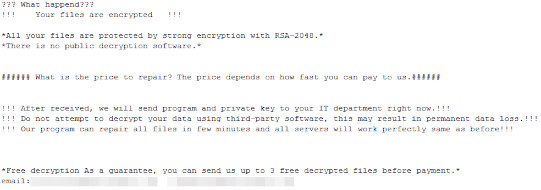Ransom.Win64.PANDORA.A
UDS:Trojan-Ransom.Win64.Fishcat.a (KASPERSKY)
Windows


Threat Type: Ransomware
Destructiveness: No
Encrypted: No
In the wild: Yes
OVERVIEW
This Ransomware arrives on a system as a file dropped by other malware or as a file downloaded unknowingly by users when visiting malicious sites.
It avoids encrypting files with the following file extensions.
TECHNICAL DETAILS
Arrival Details
This Ransomware arrives on a system as a file dropped by other malware or as a file downloaded unknowingly by users when visiting malicious sites.
Other Details
This Ransomware requires the following additional components to properly run:
- %System%\versions.dll → encrypted binary, detected as Ransom.Win64.PANDORA.A.enc
(Note: %System% is the Windows system folder, where it usually is C:\Windows\System32 on all Windows operating system versions.)
It does the following:
- It compares the time and date of execution to December 9, 2022 7:00:00 AM GMT
- if less than, it will perform infinite sleep until the required date and time is met
- if greater than, it will load and decrypt %System%\versions.dll in memory
- It writes the following as ransom note at the start of each encrypted file.

Ransomware Routine
This Ransomware avoids encrypting files with the following strings in their file path:
- AppData
- Boot
- Windows
- Windows.old
- Tor Browser
- Internet Explorer
- Opera
- Opera Software
- Mozilla
- Mozilla Firefox
- Temp
- $Recycle.Bin
- System Volume Information
- $RECYCLE.BIN
- $WinREAgent
- ProgramData
- All Users
- bootmgr
- ntldr
- Program Files
- Program Files (x86)
- #recycle
- PerfLogs
- Recovery
- Public
- Default
- Default User
It appends the following extension to the file name of the encrypted files:
- .bak9
It avoids encrypting files with the following file extensions:
- .exe
- .dll
- .jar
- .inf
- .ini
- .bin
- .efi
- .db
- .dat
- .log
- .hta
- .cpl
- .cab
- .cur
- .sys
- .idx
- .drv
- .hlp
- .icl
- .icns
- .ico
- .ocx
- .pandora
- .spl
- .msi
- .iso
- .DAT
- .bak9
SOLUTION
Step 1
Before doing any scans, Windows 7, Windows 8, Windows 8.1, and Windows 10 users must disable System Restore to allow full scanning of their computers.
Step 2
Scan your computer with your Trend Micro product to delete files detected as Ransom.Win64.PANDORA.A. If the detected files have already been cleaned, deleted, or quarantined by your Trend Micro product, no further step is required. You may opt to simply delete the quarantined files. Please check the following Trend Micro Support pages for more information:
Step 3
Restore encrypted files from backup.
Did this description help? Tell us how we did.

